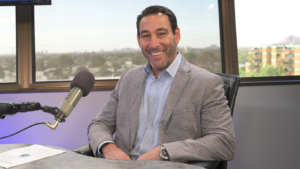As a young sports fan, a 14-year-old played basketball and baseball. Growing up in Arizona, spring training games were some of his favorite pastimes, and he’d cheer on the Diamondbacks at Chase Field with his family on Opening Day.
Gabe Trujillo lived his life like any other young sports fan.
Then he got sick.
A young Trujillo, who was just a freshman in high school, suffered a severe asthma attack that put him in the hospital with a collapsed right lung, pneumonia, and ultimately was left paralyzed from the neck down.
After eight months in the hospital, Trujillo finally went home, but without a successful diagnosis for his rare condition, or answers for his paralysis.
Nearly two years later, doctors narrowed down a diagnosis, Hopkins Syndrome, which is a rare form of polio.
“After severe asthmatic episodes it causes paralysis, generally in one limb but for my unique case, for one reason or another it caused paralysis in all four limbs,” Trujillo said.
Twenty years later, Trujillo shows that he never let his experience keep him from living his life to the fullest. He is a journalist for 12 News in Phoenix, an advocate for adaptive sports, and dreams of representing Team USA in the Paralympic Games one day.
For Trujillo, it all started with a work assignment, a deadline, and maybe even some fate. When a story idea for work took another direction, it led him to find his own. Trujillo was working on a news story about adaptive sports, but when his original idea for quad rugby fell through, he came across power soccer.
“I realized the sport seemed cool and a lot of fun and I was always an athlete before I got sick so I figured I would go try it myself, so the following day I came back as a participant so I’ve been playing it ever since.”
As a child, Trujillo played baseball and basketball, so the love for sports allowed him to find a new enjoy power soccer. He plays for Arizona Heat which is part of Arizona Disabled Sports.
After 13 years of playing, he has a Premier League Championship under his belt.
“Once he found the sport I think it’s really been a blessing for him because he’s been able to do something that he loves,” said his mother, Barbara Trujillo.
Debra Trujillo attends every game her son plays in, because she says power soccer brought him out of his shell.
Arizona Heat assistant coach Barb Peacock admires Trujillo’s skills both on and off the court. As a player who is so experienced with the sport, he acts as a mentor to new members and his undeniable passion for the sport allows him to do well at any position.
“He’s really good at whether he’s playing center and directing or leading a charge towards the goal, or that little side player that you don’t know is there and all of a sudden has the ball and knocks it in,” Peacock said.
Power soccer is still not included as a sport in the Paralympic games, but the Power Chair Football board is bidding for the 2024 Paralympics in Paris. If that happens, Trujillo says he’s ready to try out for Team USA.
“Hopefully if it does happen I’ll probably go out there and try to make the team to see if I’ll make it to Team USA,” Trujillo said.
Power chair soccer, or football internationally, needs to show the International Paralympic Committee that it is a dynamic sport and popular worldwide. Peacock says so far 31 countries play power soccer. The applications for the bid must be submitted by July 9 according to Peacock.
Peacock is confident in the sport’s chances for Paralympic status. She says it is a dynamic sport that also gives opportunity to those who can’t play some of the other popular adaptive sports.
“We have a classification system which eliminates people that are too physically capable and can go play flag rugby or chair basketball, we pretty much keep it for those who have more severe disabilities, and the committee likes that its more for the more severely disabled,” Peacock said.
Like other athletes, Trujillo has a dream he strives to accomplish. He also advocates for people with disabilities and says they have stories to tell just like able-bodied people do.
“Whether it’s in a TV show or a story on the news, a lot of times people with disabilities are portrayed as victims or secondary characters,” Trujillo said. “I think we are going in the right direction but there is still a lot that can be done to show that people with disabilities can be contributing members to society.”



